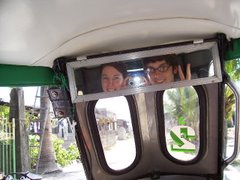Back at work now after being gone for two weeks at various Peace Corps events. We had to go to Manila for MST (mid-service training), which is now known as IST (in-service training). Why they felt they had to change the acronym, I'll never know, but apparently it makes a big difference... Anyway, we had some medical check-ups, got shots, submitted poo samples to be analyzed and had a dental cleaning. We're both ok for now, no cavities, no butt worms, so that's about all you can hope for. Living here has turned me (and I think most of us) into a hypochondriac though, because most of the illnesses you get have such vague symptoms, and it seems to me like you're always a little off here, health-wise. Not that I'm always sick, because I never really am, but you might have 3 straight days of diarrhea for no reason. Sorry to talk to much about poop, but welcome to our world. So you'll have issues like that, and then you'll consult the trusty PC-issued health manual, only to find out you could have 1 of about 17 different things. There are 6 kinds of parasitic worms that are common, along with amoebas and giardia, and they all basically have the same symptoms. LBM, but not necessarily! Trouble sleeping, fatigue... They only way to ever really tell is when a worm come out of you. Even something like typhoid is vague. Another PCV on our island has typhoid. He was having fevers for a week, went to the hospital in Manila, and after running tests, they still couldn't say %100 that he has typhoid. I mean, typhoid?! Seems like that would be pretty obvious.
The trainings were pretty bad. We were supposed to have our MST back in June, but they delayed it for 2 months so they could plan and have some quality training sessions for us. The problem is, it's september. We have 9 months left of service, and teachers only have 7. Except the month of december is pretty much a wash because of Christmas, and March is all tests, slacking off and preparation for graduation. So at this point, training isn't particularly useful. They had it anyway though, and it was not very useful, surprise surprise. Most of it was for teachers, which I didn't like, and the only session that seemed mildly interesting was organic farming, which was a really great, inspiring session, and now I think Abby and I actually have a side-project doing that with a guy we met last weekend. My favorite was a session I didn't attend, but heard plenty about. They invited a woman to come talk, but it turned out she was selling a computer program that you could buy for only $6,000 a year. So every year, you would have to come up with $6,000 (P300,000). Needless to say, if every school here had an extra 300,000 pesos just laying around every year, Peace Corps might not even need to be here. One of our friends got up and left in disgust halfway through the lady's presentation.
After that was over Abby headed home, back to school. She's moved from the high school to a local elementary school with a deaf ed program, and she's much happier, and much busier. She works with three teachers who are seemingly very pro-active, and 27 deaf students of all ages. Right now she's working with the pre-school kids, teaching them the very basics, since some of them don't have any sign language at all, not even their names. It's a lot more work, but she's actually making progress there, and will be working with the other teachers on turning their empty fourth classroom into a resource center for the SPED program. I stuck around after MST because I was one of the facilitators for a PC PDM (Project Design and Management) workshop. It was with 13 PCVs and their counterparts, and then 40 PTA members from the southern island of Mindanao. I love these trainings because I actually feel that they, unlike so much of the work I do here, make an immediate and lasting difference. You can see people slowly grasp the concepts - things like how to write a goal, or how to monitor a project - and by the end they have a well developed project that might actually succeed. I think I've said it here before, but I've decided that virtually every problem or issue here has its root in the fact that so many people in positions of power and change have virtually no planning skills. A project will just be done without any forethought, other than how much it will cost, and monitoring and evaluation is non-existent. An example would be going out and planting 2000 mangroves, without doing an assessment of the area first to decide which area is in most need of new mangroves. Then the mangroves are planted, and no one ever goes back to check on them, to make sure they're still there, to evaluate the effect they're having, whether the planting is accomplishing what you hoped it would... So there are 4 more coming up in the next 6 months, and I plan on facilitating as many of them as I can!
Monday, September 03, 2007
Subscribe to:
Post Comments (Atom)


No comments:
Post a Comment